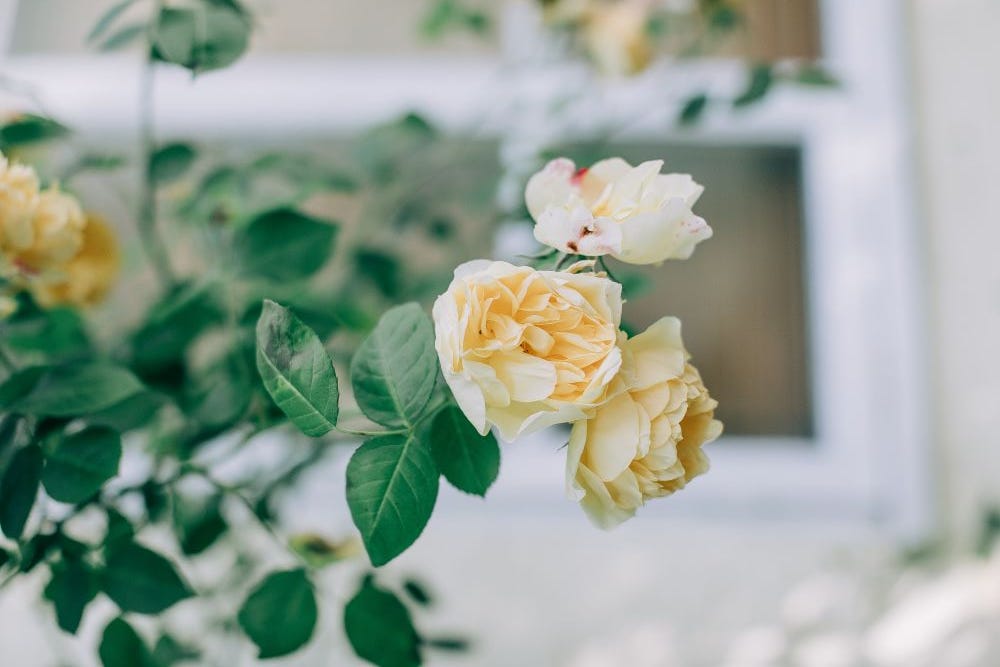I’d always thought gardens were a bother. For years, my husband handled all the “yard work,” as he called it. “I'll be out back taming nature,” he'd say, before going out to cut the grass. Except for a petunia or two, that was the extent of gardening at our house. He tried to keep the edges neat, and I tried to ignore the whole thing. It was hard enough keeping the kids alive and the house livable without adding another great big room — filled with leaves and bugs and backbreaking work — to my chores.
But one day, the nature tamer didn't live here anymore. Suddenly, it was all mine, the long green expanse of yard work. Forget it, I decided; not enough hours in the day, no idea where to begin. I bought a book called The Reluctant Gardener and was reluctant to read it.
Into my back forty, just in time, strode Dorothy. Our gardens were perpendicular, hers a stone's throw across my next-door neighbour's unfenced yard from mine. When she opened her back gate and pushed into my meadow of weeds and underbrush, she had found her cause. What a canvas for her skill and enthusiasm! And a willing pupil there too, if a bit sluggish.
She'd been watching me. Dorothy, a brisk Englishwoman in her early sixties, had also been a single mother once, had coped alone with children, work, house, and garden. She'd been good at all of them, though.
“What's this dreadful thing?” she’d say, crouching on her haunches during her tour of inspection, pulling at some obnoxious weed. “Look, these are lovely, you must fertilize,” she'd say, scrabbling to rescue some limp shoots. “The poor things won't survive without moo poo.”
“Water!” she cried. “Water water water.” I obediently began to weed and prune, bought fertilizer and a new hose, and watered. Order began to emerge; not Versailles, but there was hope.
Then she directed her fierce gaze upward to my trees, indicating which branches should be trimmed to let the sunlight in, and which trees should disappear entirely. “I like pretty trees,” she said, “but not horrible, unnecessary weed trees,” pointing a stern finger at an invasive, overgrown Manitoba maple. One strenuous, sweaty afternoon, fuelled by Dorothy's certain approval, I cut down the maple with a handsaw. She exulted in the new light for my plants. Severe with pests like earwigs, squirrels, raccoons, and sun-stealing trees, she took joy in each tiny seedling. “Oh look,” she gasped, kneeling suddenly, her nose an inch from the soil, “that datura has seeded itself. Isn't it brilliant?”
We got into the habit of strolling to the corner store, which had recently, with laudable timing, transformed its parking lot into a garden centre. She helped me choose practical perennials that might survive despite my ignorance and our climate. “Admire them all you want,” she warned, as I swooned over the big blue delphiniums, “but they're impossible.” If Dorothy couldn't raise them, there was no chance for me. But bit by bit, month by month, we planted clematis, lilies, astilbe, cosmos, wisteria, morning glory. Glorious.
Inevitably, as we sat after garden work, two single women and a bottle of wine under a canvas umbrella, our conversation turned to domestic matters. Fifteen years older than I, Dorothy had a lot to say about raising healthy children as well as plants. Her husband had left her for a younger, childless woman with a glamorous job. Dorothy had raised two young girls and twin boys, now adults who keep a close eye on their mother's well-being. She dotes on her two grandchildren. Because her own family was spread around, she adopted us as a nearby substitute — mother, children, and greenery.
Of course she had advice about my kids. “I don’t worry about your daughter. She’s a powerhouse, like you,” she said, although “powerhouse” is the last word I’d have used for myself. Dorothy was concerned about my boy, that he was insecure and fearful and struggling. I wouldn’t admit — couldn’t admit — that she was right.
Last May she helped me plant a long row of tomato seedlings at the back where our gardens would have intersected if my long-suffering neighbour hadn't been in the way, and by late summer we had a rich harvest. “You've become a real gardener,” she said, as we sat slicing tomatoes and drinking in the starbursts of purple and white clematis, the black-eyed Susans, hydrangea, nicotiana, sweet-scented phlox and lavender, the rhododendron she rescued from someone's garbage, the sunflowers, and wild sweet pea. I didn't leave the city at all that summer, mostly sat in the garden and looked. Hard to believe my clumsy hands had something to do with such profusion.
But the autumn brought devastation for my friend and mentor. A decade-old romance — “my beloved,” she called him, the love of her life — turned into heartbreak when he decided to move on. Her back began to give her such pain that she reluctantly submitted to an operation, which left her helpless for weeks and in more pain than before. Walking with a limp when she could walk at all and unable to bend down to garden, she realized she could no longer cope alone. In the winter, she and her married daughter sold their own homes and bought a big house together on the far side of town.
And now she's recovering from an operation on her lung, enduring further tests, awaiting the diagnosis for her future. All this from one summer to the next. When she found out she had cancer, she told me on the phone, she went out to rip dandelions from the lawn. “I think of them as a kind of cancer,” she said, “and I thought, ‘Right, I've got you lot!’”
For a long time, this spring, it was hard to garden without her. What was the point, without my friend’s encouragement and expertise? But then she recovered enough to visit, inspect, and urge me on. We walked slowly to the corner store and up and down the fragrant aisles while she commented on each plant, and we chose a few. I began to weed and water. I even planted a tomato, only one. It's hard to relish the loveliness Dorothy inspired in my garden, while she is in pain, and afraid.
What’s needed now is a buddleia. My friend loves buddleias because after the war, they sprouted miraculously out of bombed-out buildings in London, adding colour and delicate beauty to the rubble. She’d found one for me last year, and we planted it before she moved, but it didn't survive the winter.
I will plant a new buddleia in honour of Dorothy who, I pray, will go on teaching me about colour and beauty, about patience, and sunlight, and the hard work that is love.
Postscript: We no longer rip up dandelions, which are now considered important for bees and other pollinators. Dorothy would certainly have changed her botanical behaviour with the times, but she did not have that chance. She moved back home to England, to her twin sister Lizzie’s rambling country house; her sickbed was placed so she could look out the window at Lizzie’s dogs, trees, and flowers. She died in that bed. Lizzie planted and tends a mass of pink and white roses on Dorothy’s grave, in the village churchyard.
There’s a picture of Dorothy’s new garden on the wall in front of me as I write. Her present to me, my own garden, is one of the great enchantments of my world. I think sometimes it has saved my life.
Here is photo of my garden of delight:








Beth, I am almost finished reading your new book: Mid-life Solo. I have enjoyed all of the stories in the book. Kudos on a beautiful accomplishment.
Dear readers and Alice, it has done my heart much good to see that the essay resonated so deeply with so many. FYI, it's an excerpt from Midlife Solo, my new book of essays. If you liked that one, you might like at least some of the others.